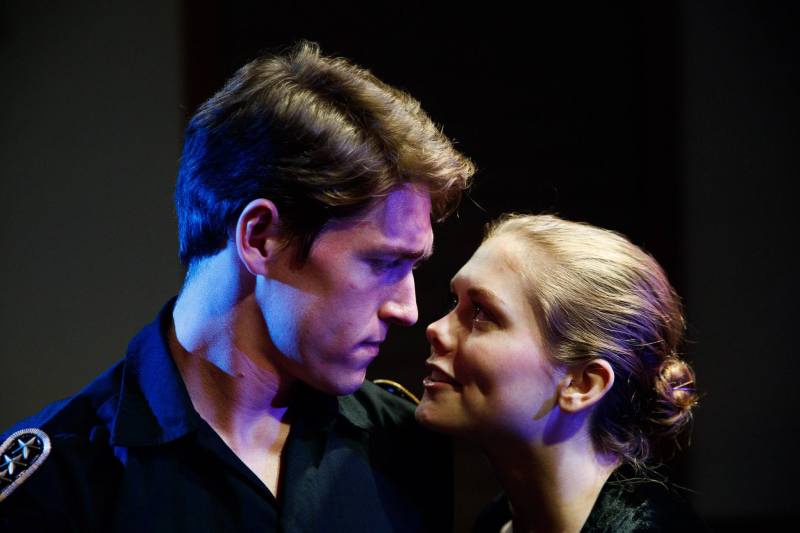Three hooded figures, all masked with gold, stand in a triangular formation. Their voices are eerily calm. Waves of distorted frequencies begin to permeate the theater. Suddenly, the figures drop to the ground, as if possessed by some demonic force, and contort their bodies in rhythmic disharmony. So begins Stanford Shakespeare’s (StanShakes’) haunting performance of Shakespeare’s “Macbeth,” a wickedly smart production which reimagines this classic Shakespearean tale with a focus on the nature of evil, using supernatural forces to uncover natural human tendencies.
StanShakes’ production highlights the internal human capacity for death and destruction through magical, external embodiments of evil — namely, the aforementioned hooded witches, whose masked ephemeral appearances suggest that evil is an anonymous force which can overtake anyone. StanShakes’ interpretation of this classic piece is haunting, but this is what makes the show both resounding and brilliant.
While “Macbeth” is certainly not a modern show, StanShakes’ production — smashingly directed by Matthew Libby ‘17 and produced by Sarah Burnett ‘19 — still finds new ways to make the show feel fresh and accessible to its modern audiences. The most striking original element of the production was the stage itself. Positioned at a slight diagonal, the straight-edged black stage stretches across the length of the performance space. The stage resembles a road, perhaps mirroring the fateful road which Macbeth must travel in order to fulfill the witches’ prophecies — and his own downfall.
Jake Goldstein ‘19 as Macbeth adroitly masters his character’s descent into madness. In his first scene, Goldstein struts confidently across the stage, having just won in battle. However, upon murdering his own cousin, the king, he quivers, furrows his brows in fear and cries out with guilt. When his character experiences guilt-ridden hallucinations, from the floating dagger and the ghost of Banquo, Goldstein widens his eyes, as if in a trance, and screams without abandon, much like a real madman. However, Goldstein is careful not to overdo his performance by slowly building up to his character’s fits of terror. He starts with quick, pacing movements and transitions his voice into louder and louder exclamations of fear. Goldstein’s balanced performance keeps Macbeth’s humanity intact, whether he writhes at the feet of the witches or he kneels in despondence upon recognizing his impending doom.
Throughout the course of the show, Gracie Goheen ‘20 as Lady Macbeth transforms from cutthroat to pleading and desperate. In Act I, she slinks to the ground and shouts at dark spirits, commanding them to “unsex her.” This speech is iconic, and Goheen adds her own twist to the performance by resting on her knees, as one would pray in church. However, her fervent yelling, clenched fists and consorting eyes betray the seemingly sacred position. Although Lady Macbeth is undoubtedly cold and ambitious, Goheen displays moments of fear to ground her character in reality, especially as she stands paralyzed during Macbeth’s proclamation to the “seeling night.” In her final scene, as she continuously scrubs the imagined blood off her hands, Goheen displays her ultimate transformation. Her hair transforms from a tight updo to down and unkempt, and her movements evolve from calculated steps to slow, unmethodical strides.
As for transitional cues, the lighting, designed by Garrick Fernandez ‘19, makes great use of red undertones to highlight the tension during pivotal scenes. These red lights, which noticeably shine on the faces of each character, highlight the violence, the guilt and the misplaced ambition gone awry. In the final scene, in which Macduff (Kaya McRuer ‘17) and Macbeth face off, swords in hand, the red lights begin to flash all over the room. At the same time, siren sounds began to blare, signifying the death and danger to come. This technological twist suggests urgency in a contemporary lens, pushing the audience to consider this age-old tale in modern application.
At the center of this show lies not the struggle between Macduff and Macbeth, but the one between morality and ambition. Certainly, political ambition is a powerful theme in the show; it drives Macbeth to murder his own cousin in cold blood and to plot the assassination of his close friend. In “Macbeth,” political ambitions come at the cost of order and morality. When avaricious political leaders take power, turmoil ensues. This message is eerily applicable to “today’s modern political climate,” as Libby states in his director’s note.
With superb technical elements and a strong cast of actors, StanShakes revitalizes the timeless tale of Macbeth into a relatable, timely story about the dangers of egocentric ambition, as well as the hopeful promise of restored social order. Although “Macbeth” has been performed time and time again, there is a sense of urgency and insight in this production that makes it unique.
Contact Alli Cruz at allicruz ‘at’ stanford.edu.
